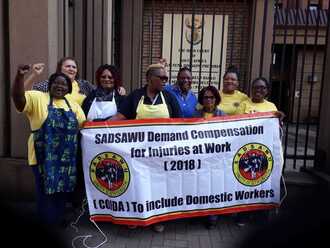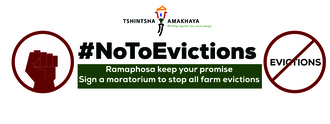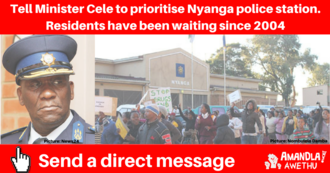- Featured
- Clean air
- Climate justice
- Consumer Rights
- Corporate Accountability
- Data access
- Early Childhood Development
- Economic fairness
- Education
- Electoral fairness
- Environmental justice
- Food justice
- Gender based violence
- Grants/social assistance
- Health
- Housing and infrastructure
- Industry interference
- Land Justice
- LGBTQIA+ rights
- Media/ information access
- Public transport
- Racism
- Reparations
- Safety
- Sanitation
- Service Delivery
- Sexual and Reproductive Rights
- Social justice
- Unemployment
- Womxn's rights/ gender equality
- Workers' rights
- More
-
We demand a Sexual Offences Unit at Rhodes University!Two years ago, with what sparked an international conversation on the issue of rape and rape culture, commonly known as the #RUReferenceList protests, women and non-binary individuals set precedent for other institutions across the country to participate in a national discussion on problematizing how unsafe campuses are. In 2016 women, from all walks of life across the country demonstrated in solidarity with those at Rhodes University – highlighting not only the prevalence of GBV in our society, but also the failure of institutions in protecting its students. Since the advent of democracy, our institutions pride themselves in being leaders of transformation in society. They have prided themselves in being vehicles providing a vast range of knowledge to individuals entering their spaces. Yet, when it comes to issues of gendered discrimination and the effects it has on individuals – particularly women and minority groups – our cries seem to be invalid, and our experiences erased. We are tired of saying “enough is enough!” when it only suits the institution’s agenda. Your ‘enough’ does not suffice as every day we continue to live in fear of when our bodies will become another statistic to the vast crimes we experience on a daily basis. A Sexual Offences Unit will ensure that survivors of gendered and sexual orientation violence are met with the utmost sensitivity, specialized support and resources that will help towards their healing processes. The Sexual Offences Unit should include: support staff who encourage students to go for prosecution through reporting their cases; this consists of 24 hour psychologists available at all times of emergencies, and a space for student activists to assist in sharing insights to developing better models aimed at reducing all forms of violence on campus. This unit needs to be cognizant of all socio-economic demographics of the student body, and thus be able to cater to survivors of all backgrounds. The unit will provide sensitized support to student survivors who might not want to go through reporting their cases at the SAPS where they face further victimization due to a lack of training, resources and subsequently compassion. Rhodes University needs to cultivate a space that will ensure a prioritization of justice to survivors of sexual violence. In conjunction to this, the unit will have to implement the recommendations that were presented by the Sexual Violence Task Team at the end of 2016 in response to the demands of the student led protest #RUReferenceList. This unit will be very important as students leave college and university environments to enter the working space where issues of harassment are also prone. Socialization plays a huge part in curbing violence in our country, and it should start at home, in this case, at school. Rhodes University, much like society at large, needs to tackle gendered discrimination systemically through acknowledging and institutionalizing a culture of accountability in relation to the violence students experience. We need to push for our spaces of higher learning, the communities that we occupy every day, to internalize on a personal level policies and practices that speak to dismantling this culture of protecting perpetrators and stigmatizing survivors.841 of 1,000 SignaturesCreated by Yolanda Dyantyi
-
Tell the government to provide adequate information on free safe, legal abortion.In 2017 Akhona Matyeni* a matric learner from rural Umthatha, lost her life to an illegal abortion. Akhona bled to death after taking what she knew to be abortion pills, purchased for R200 from an unknown man who's phone number she had found on a poster on the streets of Umthatha. Akhona did not know that she could access a safe, legal abortion for free at a government hospital or clinic she was just desperate to ensure that nothing came between her and obtaining an education. According to the World Health Organization up to 13% of deaths among pregnant women can be attributed to unsafe abortions. Despite the fact that abortion is legal in South Africa, it is estimated that between 52% and 58% of the estimated 260 000 abortions that take place in the country every year are illegal [1]. By South African law a legal abortion can only be performed by a midwife, a registered nurse trained for the procedure, a general practitioner or a gynecologist. Many South African women and girls remain unaware of the law and the services they are entitled to. A 2005 study published in the International Journal of Gynecology & Obstetrics reveals that, in a sample of 50 South African women who had terminated pregnancies illegally/outside of designated facilities. Over 50% admitted they had done so because they "did not know the law". A further 15% said they knew their rights but they did not know where to access safe, legal abortions [2]. Access to safe abortions saves women's lives everyday. A lack of information shouldn't stand in the way of that. In South Africa poor provision of adequate information remains one of the main barriers for women who seek safe, legal abortions. As things stand it is much easier for women to access information on unsafe, illegal abortions than it is to access information on the free safe, legal abortions that our government is constitutionally obligated to provide. In 2017 Amnesty International reported that less than 7% of South Africa's 3 880 public health facilities perform termination of pregnancy. This is a figure that is far less than the 505 medical facilities that the Department of Health claims to have designated to perform termination of pregnancy across South Africa [3]. This indicates that beyond the issue of the lack of available information on safe, legal abortion facilities, there is the issue of the Department of Health itself not having accurate information on the functionality of its own facilities. An investigation into the functionality of existing facilities is imperative for us to ascertain exactly how many facilities are available and what their capacity is. A national online abortion database will ensure that every woman has direct access to information on where and how they can access a free safe, legal abortion. These interventions will save lives by drastically decreasing the number of illegal abortions taking place in our country and putting an end to the desperation that forces women to undergo unsafe, illegal abortions. We call on the public to take a stand and put pressure on our government to make these important interventions in order to save the lives of women who are turning to unsafe, illegal abortions everyday because of a lack of information. We call on you to stand with us as we demand reproductive justice for all! *Not her real name SOURCES [1] SAnews. (2018). SA's illegal abortion rate alarmingly high. [online] Available at: https://www.sanews.gov.za/south-africa/sas-illegal-abortion-rate-alarmingly-high [Accessed 6 Sep. 2018]. [2] Tshangela, L. (2018). Only 40% of public clinics provide abortions: Study - [online] SABC News - Breaking news, special reports, world, business, sport coverage of all South African current events. Africa's news leader. Available at: http://www.sabcnews.com/sabcnews/only-40-of-public-clinics-provide-abortions-study/ [Accessed 5 Sep. 2018]. [3] Dyk, J. (2018). When there was no list of free abortion clinics, we made our own. Here's how.. [online] Bhekisisa. Available at: https://bhekisisa.org/article/2017-11-10-00-mind-the-gap-only-5-of-health-facilities-offer-abortions-heres-how-to-find-them [Accessed 6 Sep. 2018].521 of 600 SignaturesCreated by Noxolo Mfocwa
-
Minister of Labour wants to change the law so domestic workers can get compensation - support thisDomestic workers are denied compensation for injuries because they are excluded from the Compensation for Occupational Injuries and Diseases Act (COIDA). But an amendment to the law has been proposed. But we only have 7 days before public submissions close, and we need to come together in numbers to ensure the law is changed. Maria Mahlangu, a domestic worker drowned in 2012. Her family was offered only R2500 compensation. Johanna Motha was bitten by her employer's dog and set home without medical treatment. She ended up dying as a result of her injuries. These are just two of the countless incidences of injury and illness domestic workers have faced on the job. SADSAWU( South African Domestic Service and Allied Workers Union) brought an application against the Minister of Labour and the Compensation Commissioner for domestic workers to claim compensation in terms of the Compensation for Injuries and Diseases Act 130 of 1993(COIDA), in response to the poor compensation Mahlangu's family was offered. The case has been pending since 2015. The case has recently been postponed, after being set for the 15th of October. This case is an example of the consequences of domestic worker's exclusion in this Act. We call on you to recognize this case, as well as the rights of domestic workers. The reality is that domestic work opens itself up to abuse. This abuse is targeted at Black working class womxn, who work behind closed doors and make up the largest percentage of domestic workers. Issues like health are always linked to racism and classism. Domestic workers are not seen as equals to their employer and are treated with contempt and disrespect. In the past domestic work, was not regulated by government, because they were not part of key labour legislation. Their work, was therefore seen as casual and informal, and little respect was paid to the work they do. This attitude of disregard towards domestic workers, is still seen in the way employers treat domestic workers. We are not paying enough attention to the health of domestic workers. Even though domestic work is included in the Occupational Health and Safety Act, they are still not a part of the Compensation for Occupational Injuries and Diseases Act [1]. This means domestic workers cannot seek medical compensation for costs linked to work related injuries and diseases. Domestic workers have to cover their own medical expenses when injured on the job. This is often times impossible- due to the small sum of money they are paid. Domestic workers should be paid R1787.80 a month [2], this is hardly enough to cover basic living expenses and transport to work. A study by Dr. Lindiwe Innocentia Zungu on the health conditions domestic workers experience. The findings were that there are a range of workplace health hazards. These included “chemical hazards due to detergents and other chemicals used for cleaning purposes, and physical hazards from activities involving manual handling and/or repetitive movements, e.g. scrubbing floors, moving furniture, washing and ironing clothes.... Furthermore, psycho-social hazards due to urbanization were also prevalent among participants who resided in their employers’ premises.'' [3] It is clear that domestic work can be dangerous, physically and mentally. This is why it is important that we demand for the Minister of Labour to commit to including domestic workers in the Compensation for Occupational Injuries and Diseases Act. By including domestic workers in this Act, they will have access to health care, when faced with injury or illness acquired on the job. Their inclusion in this Act is also a message of recognition for the important work they do. By getting enough signatures on this petition, together we can demand the Minister of Labour to commit to making domestic work a priority and include them in the Compensation for Occupational Injuries and Diseases Act. [1] “The 2018 minimum wages for nannies and domestic workers.” Nic Anderson. 13 December 2017 for Parent24 [2]“Bill on labour brokers gets green light”Nov 12 2013 Sapa. Fin24 [3]"Employment conditions and challenges associated with being a domestic worker in KwaZulu-Natal, South Africa. "Dr Lindiwe Innocentia Zungu, Associate Professor, University of Johannesburg, Faculty of Health Sciences.1,683 of 2,000 SignaturesCreated by Clio Koopman
-
Title deeds for the deserving residents of Pennyville flatsThe majority of people living in Pennyville are currently either unemployed or the families are child run or elderly run with most receiving grants. Most of them cannot afford the rentals and therefore in arrears amounting to thousands of rands. Attempts to address this matter with the relevant authorities have been unsuccessful.59 of 100 SignaturesCreated by Thabiso Seipobi
-
Tell MTN to stop stalling #DataMustFall#DataMustFall got ICASA, the communications regulator, to introduce new rules that stop networks from chowing airtime when your bundle runs out, and making your data expire. But 24 hours before networks had to implement ICASA’s the new rules, Cell C made an urgent application to the court to stop the new ICASA regulations. MTN has joined Cell C in this action. ICASA has pushed back [1], but needs our help in creating public pressure to save millions of Mzansi’s people who continue to be pick pocketed by networks. Will you call on MTN to drop the legal action and comply with ICASA’s regulations? Recently, MTN announced a 200% data price increase [2]. It is hardly surprising that MTN are stalling the ICASA regulations given share prices have dropped by 53% over three years [3] They are trying to use the poor to maintain their profit margins and make returns for their shareholders. We know that MTN are merely stalling the regulations with this legal action- and we can beat them. Already, thousands of people across Mzansi joined the #DataMustFall campaign, and made submissions to ICASA on how these ridiculously high data prices affect them. Our actions resulted in regulations that will allow us to carry over unused data and not be charged high out-of-bundle rates without consent. With each month that passes without these regulations coming into effect, more money is robbed from our pockets. If we apply enough pressure on MTN as its customers, we could force them to back off this legal action and comply with the ICASA regulations. By emailing the CEO of MTN about his network’s actions, we will expose them to public scrutiny, creating a public backlash that could force them to drop their legal action. Will you sign? [1] ICASA Notes Cell C's Urgent Application To Review The Eussc Regulations. 7 June 2018. [2] Fans ready to cancel MTN after 200% data bundle price increase, Kyle Zeeman for TshisaLive. 17 July 2018. [3] SA telecoms shares come tumbling down, Tech Central. 27 June 2018.378 of 400 SignaturesCreated by Amandla.mobi Member
-
Tell Vodacom to implement ICASA rules to make data last#DataMustFall got ICASA, the communications regulator, to introduce new rules that stop networks from chowing airtime when your bundle runs out, and making your data expire. But 24 hours before networks had to implement ICASA’s the new rules, Cell C made an urgent application to the court to stop the new ICASA regulations just hours before they were meant to be implemented. MTN and Telkom have joined Cell C in this action. ICASA has pushed back [1], but needs our help in creating public pressure to save millions of Mzansi’s people who continue to be ripped off with high data prices. While it doesn’t appear that Vodacom have joined MTN, Cell C and Telkom in taking legal action against ICASA over the regulations, they are benefiting from the regulations being delayed. Let’s demand Vodacom show leadership and implement the regulations. Will you call on Vodacom to immediately comply with ICASA’s regulations? The people of Mzansi voiced how they were affected by high data costs charged by the likes of Vodacom and other service providers. The Independent Communications Authority of South Africa (ICASA), after public hearings, published End-User and Subscriber Service Charter Regulations which were meant to come into effect on 8 June 2018, relieving the enormous data costs we all face. It's not surprising networks want to undermine ICASA so our Data Must Fall campaign isn't successful. They have a lot to lose should the regulations be implemented. Last year, Vodacom reported that they make R2 billion per month from data alone [2]. Research shows that low income consumers are paying disproportionately high charges, and are not seeing benefits of competition in comparison to high income consumers who are able to buy larger quantities of data [3]. [1] ICASA Notes Cell C's Urgent Application To Review The Eussc Regulations. 7 June 2018. [2] Vodacom now makes R2 billion per month from data, My Broadband. Jan 31, 2018. [3] Izolo: mobile diaries of the less connected, Research report by Making All Voices Count. 20 Nov 2017. [4] MTN, Vodacom charging up to 2 639% more for out-of-bundle data - report, Kyle Venktess for Fin24. 12 march 2018.526 of 600 SignaturesCreated by Amandla.mobi Member
-
Tell Cell C to stop stalling #DataMustFall#DataMustFall got ICASA, the communications regulator, to introduce new rules that stop networks from chowing airtime when your bundle runs out, and making your data expire. But 24 hours before networks had to implement ICASA’s the new rules, Cell C made an urgent application to the court to stop the new ICASA regulations just hours before they were meant to be implemented, them. Now, MTN has joined Cell C in this action. ICASA has pushed back [1], but needs our help to save millions of Mzansi’s people who continue to be ripped off with high data prices. We know that Cell C are merely stalling the regulations, and our savings, with this court action - and we can beat them. Already, thousands of people across Mzansi joined the #DataMustFall campaign, and made submissions to ICASA on how these ridiculously high data prices affect them. Our actions resulted in regulations that will allow us to carry over unused data and not be charged high out-of-bundle rates without consent. If Cell C [2] get their way, it could be a huge setback for our campaign to bring the cost of data down. ICASA is defending the regulations in court, but the networks could drag this matter out to ensure the regulations are never implemented. Already they have blocked ICASA’s ability to penalise networks for not complying with the regulations. Each month that passes without these regulations coming into effect, more money is robbed from our pockets. If we apply enough pressure on Cell C as customers, we could force them to back off this legal action and comply with the ICASA regulations. By emailing the CEO of Cell C about his network’s actions, we will expose them to scrutiny, creating a public backlash that could force them to drop their legal action. Will you sign? [1] ICASA Notes Cell C's Urgent Application To Review The Eussc Regulations. 7 June 2018. [2] Cellphone networks gear up for legal battle over Icasa data ruling, Cape Talk. 6 July 2018.154 of 200 SignaturesCreated by Amandla.mobi Member
-
Tell Telkom to stop stalling #DataMustFall#DataMustFall got ICASA, the communications regulator, to introduce new rules that stop networks from chowing airtime when your bundle runs out, and making your data expire. But 24 hours before networks had to implement ICASA’s the new rules, Cell C made an urgent application to the court to stop the new ICASA regulations just hours before they were meant to be implemented, them. Telkom has also taken legal action. ICASA has pushed back [1], but needs our help in creating public pressure to save millions of Mzansi’s people who continue to be ripped off with high data prices. The people of Mzansi voiced how they were affected by high data costs charged by the likes of Telkom and other service providers. The Independent Communications Authority of South Africa (ICASA), after public hearings, published End-User and Subscriber Service Charter Regulations which were meant to come into effect on 8 June 2018, relieving the enormous data costs we all face. Telkom said they welcome ICASA’s position on the need for fairness in business practice around data pricing and the expiry of data bundles [2]. And we need to make sure that they remain true to their word. Research shows that low income consumers are paying disproportionately high charges, and are not seeing benefits of competition in comparison to high income consumers who are able to buy larger quantities of data [3]. [1] ICASA Notes Cell C's Urgent Application To Review The Eussc Regulations. 7 June 2018. [2] New data rules: MTN‚ Vodacom‚ Cell C and Telkom respond, Adiel Ismail for Fin24. 29 April 2018. [3] Izolo: mobile diaries of the less connected, Research report by Making All Voices Count. 20 Nov 2017. [4] MTN, Vodacom charging up to 2 639% more for out-of-bundle data - report, Kyle Venktess for Fin24. 12 march 2018.183 of 200 SignaturesCreated by Amandla.mobi Member
-
Stop all farm evictions1. Over 20 000 people are threatened by farm evictions in the Western Cape, Tshintsha Amakhaya is calling on president Cyril Ramaphosa to keep his promise following an announcement he made in Paarl in 2014 that there will be a moratorium as an immediate ban on legal and illegal farm evictions. Following the massive farm workers strike in De Doorns, Ramaphosa said, “We are calling on all farmers who have plans for evictions to stop the evictions.” However, the moratorium never came to effect. Instead, instances of farm evictions and human rights violations on farms persist. Today, Drakenstein Municipality has about 1,127 pending eviction matters. 2. The thousands of illegal evictions of farm workers and other farm dwellers continue to be evicted across the country despite the clear protections contained in the Extension of Security of Tenure Act 62 of 1997 (‘ESTA’) that a farm worker and persons living in the same dwelling as the worker may only be evicted: a) in terms of an order of the court b) once the court is satisfied that the eviction would be just and equitable c) and once the Land Claims Court has confirmed the order; 3. The great hardship, conflict and social instability caused by such evictions on a group of people already rendered vulnerable through their insecure tenure. 4. The disproportionate impact of these illegal evictions on women due to the commercial agricultural system that continues to confine women to an auxiliary labour category increasing their vulnerability to labour-related evictions. 5.The total system failure to protect the rights and security of farm workers and dwellers due to poor enforcement and resource endowment of ESTA; 6. The continued failure of municipalities to provide adequate alternative shelter as legislatively prescribed. 7. The Constitutional imperative, in section 25(6), to ensure that person whose tenure of land is legally insecure as a result of past racially discriminatory laws or practices, like farm workers and other farm dwellers, are provided with either legally secure tenure or comparable redress. Both farm workers and dwellers should be prioritised and be at the forefront of cases on which expropriation without compensation will be tested. “We used to work hard on this farm until we were retrenched in 1999. Nothing happened on the farm for 11 years and most of us couldn’t find work again. Now this farmer wants to evict us” This a desperate cry by a mother whose family is facing eviction from the farm she's worked and lived in for years [1]. She, like many others, now face a bleak future of being dumped on the road side with no protection and nowhere to go. President Cyril Ramaphosa made a promise in 2014 to stop farm evictions until people can be given dignified housing [2]. Even more recently, Deputy Minister Mcebisi Sikwatsha has seen with his own eyes the desperate situation farm workers are faced with [3] and also made promises to take it up with his Minister and President. We however cannot leave it to them. Thousands of illegal evictions of farm workers and other farm dwellers continue to be evicted across the country despite the clear protections contained in the Extension of Security of Tenure Act (ESTA). Places like Drakenstein are eviction hotspots with 1,127 pending evictions matters [4]. Evictions bring great hardship, conflict and social instability. The failure to protect the rights and security of farm workers and dwellers due to poor enforcement of ESTA and the failure of municipalities to provide adequate alternative shelter as legislatively prescribed need to be addressed. We need to stand with those being evicted and demand that government responds to the cries of the people. Will you tell President Cyril Ramaphosa and Minister Maite Nkoana-Mashabane to stop all farm evictions and help protect the rights and security of farm workers and dwellers? [1] [3] Western Cape could be testing ground for land expropriation without compensation, says minister, Barbara Maregele for Groundup News. 5 June 2018. [2] Ramaphosa asked to keep his promise to freeze farm evictions, Barbara Maregele for Groundup News. 5 April 2018. [4] Woman faces eviction after 51 years on a farm, Barbara Maregele for Groundup News. 31 May 2018.426 of 500 SignaturesCreated by Tshintsha Amakhaya

-
Waiting 14 years for a 2nd police stationJust two months ago, four people aged between 12 and 28 were killed in Nyanga. Another person was hospitalised [1]. Murders like this are not rare in the township. In the last two years alone, the murder rate has increased, with one in 206 people killed every year [2]. In the police ministry budget tabled in May, the Minister of Police announced that the residents of Nyanga will have to wait until 2023 for construction of a second police station. This despite the fact that the one currently servicing the community is severely overstretched and doesn’t even have enough space for all its police officers. For years now, the people of Nyanga have lived in terror. The township is known as Mzansi’s murder capital. The Department of Police has for years ignored calls for a second station. But with support from amandla. mobi, the calls for the police station grew louder, and in October a piece of land to build a police station was identified [3]. But now the current Minister, Bheki Cele, has shown that he too is in no rush to move it forward. His own budget speech, but if enough of us take action this is our chance to get the Minister's attention and show him that the people of Nyanga, along with the amandla. mobi community are demanding that he takes action. [1] Four killed in Nyanga shooting, Shamiela Fisher for EyeWitness News. 4 April 2018. [2] Nyanga, Western Cape, has a murder rate of one in every 206 people, Tom Head for The South African. 26 October 2017. [3] Land near Nyanga identified for a new police station, Okuhle Hlati for Independent News. 27 October 2017.111 of 200 SignaturesCreated by Amandla.mobi Member
-
Stop taxing my periodThousands of amandla. mobi members have fought hard to make free sanitary products a reality for millions of girls. Unfortunately, for the households that could put a few rands together to buy a pack, the VAT hike announced earlier this year has made it even more expensive, meaning more people who need sanitary towels could go without. But right now, we have an opportunity to change that. Public submissions to the expert panel investigating the expansion of zero rating to more items was extended. But it ends on June 4, 2018. Send the panel a direct message telling them to recommend that sanitary products are included in the list of essential zero-rated products. People who get periods will buy up to 17 000 sanitary pads or tampons in their lifetime [1]. This basically means that the average person could spend up to almost R40 000 on sanitary pads in that time [2]. This in a country in which over 50% of the population live in poverty. The VAT hike has had an impact on the cost of living in Mzansi. People are spending much more on essential food items, reducing how much they have for other needs. And living a decent, dignified life requires so much more than food. Our community exists to primarily protect us, Black women. You, and over two hundred thousand others have taken action to make this real. And we need you to once again stand with us and make sure the panel recommends dropping the tax on our periods. [1] A guide to 'alternative menstruation': Save money and the world during your period, Pontsho Pilane for Bhekisisa. 31 Oct 2016. [2] Why treasury won't support a fall in the tampon tax, Pontsho Pilane for Bhekisisa. 5 Dec 2016.680 of 800 SignaturesCreated by Amandla.mobi Member
-
Life Orientation must not be scrapped in Grades 10-12Learners need LO in Gr 10-12 and many benefit a great deal from this vital subject. The Minister made the promise in 2015 that LO will not be scrapped, but strengthened. So don''t break this promise! The implications of taking out LO will mean that teachers will not specialise in LO at universities if it is a small subject that only goes to grade 9. It will mean the end of the subject. There are many great LO teachers who are devastated. Learners only take career ed seriously in Grades 11-12. LO teachers are heartbroken at the sad news of history usurping LO. This was not a democratic decision not were LO experts consulted. To pit one subject against the other is unwise. Instead, the Department can create a subject called which can include African history and herstory, African role models and Governance, Constitution, Voting, Human Rights, etc. LO topics are vital to learners in Grades 10-12, they give in-depth career education, sexuality education, create awareness on gender issues, improve study and exam writing skills, stress management, substance abuse, environmental protection and relationships, diversity and self-esteem enhancement. They also promote Indigenous Games. [1] Motshekga defends life orientation, The New Age. 15 Feb 2017.2,353 of 3,000 SignaturesCreated by Edna Rooth
.png)




.png)
.png)
.png)
.png)



